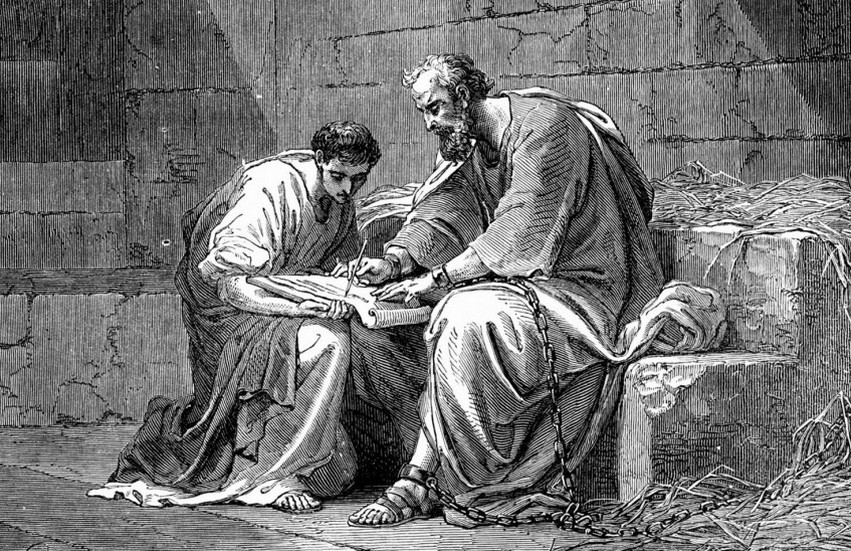bible reading apr 21-22

Bible reading for April 21 -- 22
Apr 21 -- Ecclesiastes 8 and 2 Timothy 4
Apr 22 -- Ecclesiastes 9 and Titus 1
"Who is like the wise? And who knows the interpretation of a thing? A man's wisdom makes his face shine, and the hardness of his face is changed." (Ecclesiastes 8:1)
WHAT'S SO GREAT ABOUT WISDOM (ch 8-9)? One question spans both chapters here, and that is, if calamity may befall the righteous (even as prosperity comes to the wicked), and if time and chance occur to both the righteous and unrighteous, and if we are limited in what we can know and control, then why is wisdom so important? What's so good about being wise? By the way, to the Jewish mind "chance" (9:15) means the appearance of randomness, not actual randomness -- the casting of lots (or dice) is always under the control of God (Prov 16:33; 18:18). To begin with, wisdom softens us (8:1) and gives us hope. Knowledge by itself puffs up, but wisdom humbles us and enables us to be at peace, content with God and our lot in life. Despite its limitations, having wisdom is better than not having it. The Bible is realistic about life in this fallen world, but for all the power of sin and evil that prevails in the world, it is still much better to be wise. And the wise person will know the limits of his wisdom. As you read these two chapters, make a list: what are the benefits of wisdom and what are its limitations?
SUBJECT / PURPOSE STATEMENT. In seminary we were encouraged to be able to state the subject of any given book of the Bible, along with what we could determine of the author's purpose in writing it. This is my subject / purpose statement for Ecclesiastes: "Solomon examines the futilities of life -- its limitations and exasperations, its frailty and brevity, its enigmas and injustice, its pointlessness apart from God -- in order to lead the reader to humbly revere the sovereign God, to obey what God has revealed, to live wisely in a futile world, and to enjoy what God has allotted to him." Do you think this adequately summarizes the message of Ecclesiastes?
================
"...in hope of eternal life, which God, who never lies, promised before the ages began..." (Titus 1:2)
HE KEPT THE FAITH (2 Tim 4). The Apostle Paul, like Solomon in Ecclesiastes, also contemplates the end of life, or, at least, the end of his road in this life. This chapter records his last written words. How are Paul and Solomon similar? How are they different? As you read Paul's words, ask yourself, "what do I want to be able to say to my family and friends before I leave this world?"
THE TRUTHFULNESS OF GOD (Titus 1). We begin reading the third pastoral epistle, written by Paul to Titus. Like his first letter to Timothy, Paul instructs Titus regarding the church (in Crete), to which Titus has been sent as an emissary. When we study God's word we look at the overall message, but we should also see that there are great truths packed into short statements, almost as asides. For example, "God, who never lies..." (v 2). How much there is in that one phrase! In the Greek it is only three words, "the not-lying God". It means that God is free from all deceit and completely trustworthy. "God is not man, that he should lie, or a son of man, that he should change his mind. Has he said, and will he not do it? Or has he spoken, and will he not fulfill it?" (Num 23:19) Our Lord Jesus, who is the perfect representation of God's nature, said, "I am...the truth..." (John 14:6). He is consistent with himself, and more, he is true to reality. We trust his word as infallible and inerrant because he speaks truth and is able (being all-powerful) to preserve the truth spoken. We believe what he has spoken and rest upon his trustworthy character, that he says what he means, means what he says, and will do what he promised. And so we have the strongest hope possible: "So when God desired to show more convincingly to the heirs of the promise the unchangeable character of his purpose, he guaranteed it with an oath, so that by two unchangeable things, in which it is impossible for God to lie, we who have fled for refuge might have strong encouragement to hold fast to the hope set before us." (Heb 6:17-18) There's a lot of meaning in that short phrase, "God, who never lies"!
Image credit. Etching of the Apostle Paul in prison, writing an epistle. Source unknown. About this newsletter: I post three times a week on my Bible reading, following the Robert Murray M'Cheyne (RMM) two-year reading schedule, as arranged by D. A. Carson. Scripture quotations, unless otherwise noted, are from The ESV® Bible (The Holy Bible, English Standard Version®), copyright © 2001 by Crossway, a publishing ministry of Good News Publishers. Used by permission. All rights reserved. Another resource I recommend is the NET Bible with its excellent notes at netbible.org.